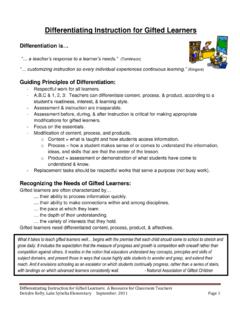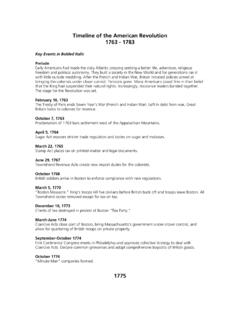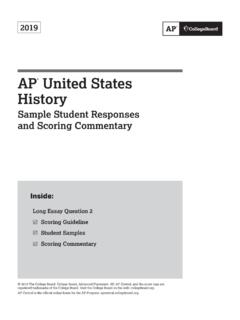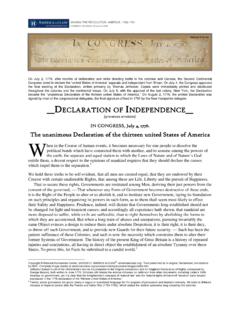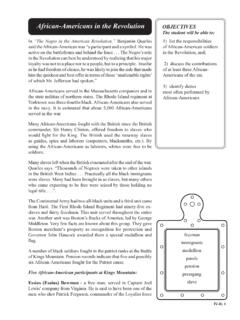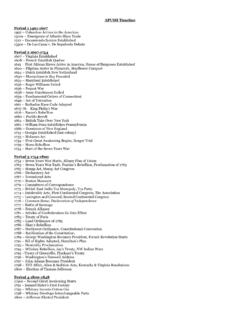Transcription of The French and Indian War Debt, 1765 - OCPS TeacherPress
1 The French and Indian War debt , 1765 Great Britain s national debt soared as a result of the French and Indian War. Subjects living in Great Britain paid more on this debt per person than people living in the colonies. British efforts to get colonists to pay a bigger share of war-related debt led to sharp conflict. The British also had large debts from the French and Indian War. The king and Parliament felt the colonists should pay part of these costs, so the British government issued new taxes on the colonies. It also enforced old taxes more strictly. To avoid taxes, some colonists resorted to smuggling. This caused British revenues to fall. In 1763 Britain's prime minister, George Grenville, set out to stop the smuggling. Parliament passed a law to have accused smugglers tried by royally appointed judges rather than local juries. Grenville knew that American juries often found smugglers innocent.
2 Parliament also empowered customs officers to obtain writs of assistance. These documents allowed the officers to search almost anywhere shops, warehouses, and even private homes for smuggled goods. Source: McGraw Hill Proclamation of 1763 After the end of the French and Indian War in America, the British Empire began to tighten control over its rather self-governing colonies. This royal proclamation, which closed down colonial expansion westward, was the first measure to affect all thirteen colonies. In response to a revolt of Native Americans led by Pontiac, an Ottawa chief, King George III declared all lands west of the Appalachian Divide off-limits to colonial settlers. The announcement banned private citizens and colonial governments alike to buy land from or make any agreements with natives; the empire would conduct all official relations. Furthermore, only licensed traders would be allowed to travel west or deal with indians .
3 Supposedly protecting colonists from Indian attacks, the measure was also intended to shield Native Americans from increasingly frequent attacks by white settlers. Although the proclamation was introduced as a temporary measure, its economic benefits for Britain prompted ministers to keep it until the eve of the Revolution. A desire for good farmland caused many colonists to defy the proclamation; others merely resented the royal restrictions on trade and migration. Source: The Sugar Act, 1764 In 1764 Parliament passed the Sugar Act, which lowered the tax on the molasses the colonists imported. Grenville hoped this change would convince the colonists to pay the tax instead of smuggling. The act also allowed officers to seize goods from accused smugglers without going to court. The Sugar Act angered many colonists. They believed this and other new laws violated their rights.
4 As British citizens, colonists argued, they had a right to a trial by jury and to be viewed as innocent until proved guilty, as stated in British law. Colonists also believed they had the right to be secure in their homes without the threat of officers barging in to search for smuggled goods. British taxes also alarmed the colonists. James Otis, a lawyer in boston , argued: "No parts of [England's colonies] can be taxed without their consent .. every part has a right to be represented." from The Rights of the British Colonies, 1763 ..great quantities of foreign molasses and syrups are clandestinely run on shore in the British colonies, to the prejudice of the revenue, and the great detriment of the trade of this kingdom, and it s American plantations: to remedy which practices for the future, be it further enacted by the authority and security, in the like penalty, shall also be given to the collector or other principal officer of the customs at any port or place in any of the British American colonies or The Stamp Act, 1765 In 1765 Parliament passed the Stamp Act.
5 This law taxed almost all printed materials. Newspapers, wills, and even playing cards needed a stamp to show that the tax had been paid. Opposition to the Stamp Act The Stamp Act outraged the colonists. They argued that only their own assemblies could tax them. Patrick Henry, a member of the Virginia House of Burgesses, got the burgesses to take action. The assembly passed a resolution a formal expression of opinion declaring that it had "the only and sole exclusive right and power to lay taxes"on its citizens. In boston , Samuel Adams helped start the Sons of Liberty. Its members took to the streets to protest the Stamp Act. Protesters burned effigies (EH fuh jeez) stuffed figures made to look like unpopular tax collectors. Colonial leaders decided to work together. In October, delegates from nine colonies met in New York at the Stamp Act Congress. They sent a statement to the king and Parliament declaring that only colonial assemblies could tax the colonists.
6 Source: McGraw Hill "An Emblem of the Effects of the STAMP." American newspapers reacted to the Stamp Act with anger and predictions of the demise of journalism. The Declaratory Act, 1766 That the said colonies and plantations in America have been, are, and of right ought to be. subordinate unto, and dependent upon the imperial crown and parliament of Great Britain; and that the King's majesty, by and with the advice and consent of the lords spiritual and temporal, and commons of Great Britain, in parliament assembled, had, hash, and of right ought to have, full power and authority to make laws and statutes of sufficient force and validity to bind the colonies and people of America, subjects of the crown of Great Britain, in all cases whatsoever. - The American Colonies Act 1766 (6 Geo 3 c 12), commonly known as the Declaratory Act Long Title: An Act for the better securing the Dependency of His Majesty's Dominions in America upon the Crown and Parliament of Great Britain People in colonial cities urged merchants to boycott refuse to buy British goods in protest.
7 As the boycott spread, businesses in Britain lost so much money that they demanded Parliament repeal, or cancel, the Stamp Act. In March 1766, Parliament repealed the law. However, it also passed the Declaratory Act, stating that it had the right to tax and make decisions for the British colonies "in all cases." Source: McGraw Hill This cartoon depicts the repeal of the Stamp Act as a funeral, with Grenville carrying a child's coffin marked "born 1765, died 1766". The caption reads: The Repeal, or the Funeral Procession, of Miss America Stamp. Repeal of the Stamp Act The coffin is carried by George Grenville, who is followed by Bute, the Duke of Bedford, Temple, Halifax, Sandwich, and two bishops. The Townshend Acts, 1767 For every hundredweight avoirdupois of crown, plate, flint, and white glass, four shillings and eight pence. For every hundred weight avoirdupois of red lead, two shillings.
8 For every hundred weight avoirdupois of green glass, one shilling and two pence. For every hundred weight avoirdupois of white lead, two shillings. For every hundred weight avoirdupois of painters colours, two shillings. For every pound weight avoirdupois of tea, three pence. For every ream of paper, usually called or known by the name of Atlas fine, twelve shillings.. Townshend Revenue Act June 29, 1767 The Stamp Act taught the British that the colonists would resist internal taxes those paid inside the colonies. As a result, in 1767 Parliament passed the Townshend Acts to tax imported goods, such as glass, tea, and paper. The tax was paid when the goods arrived before they were brought inside the colonies. The most influential colonial response to the Townshend Acts was a series of twelve essays by John Dickinson entitled "Letters from a Farmer in Pennsylvania", which began appearing in December 1767.
9 Powerfully saying ideas already widely accepted in the colonies, Dickinson argued that there was no difference between "internal" and "external" taxes, and that any taxes imposed on the colonies by Parliament for the sake of raising a revenue were unconstitutional. Dickinson warned colonists not to concede to the taxes just because the rates were low, since this would set a dangerous precedent. By then, any British taxes angered the colonists. Protests of the Townshend Acts began immediately. In towns throughout the colonies, women protested by supporting another boycott of British goods. They also urged colonists to wear homemade fabrics rather than buying fabric made in Britain. Some women's groups called themselves the Daughters of Liberty. Charles Townshend spearheaded the Townshend Acts, but died before their harmful effects became apparent. The boston massacre was the killing of five colonists by British regulars on March 5, 1770.
10 It was the culmination of tensions in the American colonies that had been growing since Royal troops first appeared in Massachusetts in October 1768 to enforce the heavy tax burden imposed by the Townshend Acts. Colonial leaders used the killings as propaganda information designed to influence opinion. Samuel Adams put up posters that described the boston massacre as a slaughter of innocent Americans by bloodthirsty redcoats. Paul Revere made an engraving that showed a British officer giving the order to open fire on an orderly crowd. The boston massacre led colonists to call for stronger boycotts of British goods. Troubled by the growing opposition in the colonies, Parliament repealed all the Townshend Acts taxes on British imported goods, except the one on tea. In response, the colonists ended their boycotts, except on tea. Trade with Britain resumed. Source: McGraw Hill This appeared with the obituary of Samuel Gray, Samuel Maverick, James Coldwell and Crispus Attucks as it appeared in the boston Gazette and Country Journal on Monday March 12, 1770.

